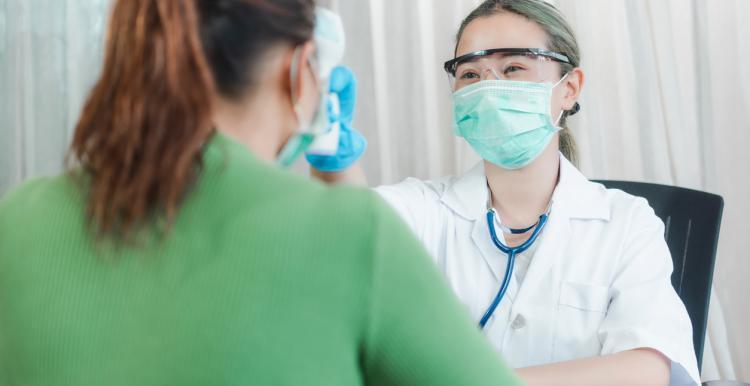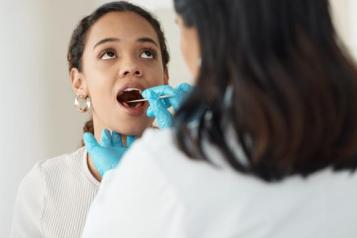Dental services in the North East and North Cumbria

We are aware that some patients are experiencing difficulties accessing dental services in some part of the region, and practices are working hard to deal with workforce challenges and make as many NHS appointments available as possible to meet the high levels of demand.
The COVID-19 pandemic and the requirement to follow strict infection prevention control guidance between April 2020 and June 2022, to ensure that patients could be treated safely, significantly impacted on the number of patients that could be seen. Demand for NHS care is therefore significantly higher than pre-pandemic levels at all practices. Whilst the number of available appointments for regular and routine treatment is increasing, dental practices are still balancing clearing any backlog with managing new patient demand.
Whilst NHS dental practices are open and able to safely provide a full range of treatments, the high treatment needs of patients and the workforce challenges practices are currently facing means that it is likely to be a while longer before dental practices are able to manage the high demand of patients wishing to access dental care. Patients with urgent needs and delayed treatments will be seen first, with routine and non-urgent dental care provided on a prioritised basis.
Work is underway at a national level to identify solutions to the recruitment and retention pressures in NHS dental services, and to understand and address the constraints of the current national NHS dental contract mechanisms.
The local NHS England dental commissioning team is working with local dental networks and providers, and utilising additional national support to explore all opportunities to increase capacity and improve access to local dental services, focusing on prioritising patients most in need.
Some of the work undertaken to date includes:
- Additional funding was made available for practices who have the capacity to deliver additional clinical sessions outside of the normal opening hours, to provide treatment to patients with urgent dental care needs.
- Incentives offered to all of our NHS dental practice to prioritise patients not seen in the practice within the last 12/24 months who require urgent dental care.
- Funding also made available to improve access to clinical triage via NHS111, and out of hours dental treatment services.
- Working with dental providers to support them to deliver their maximum potential treatment capacity which includes asking practices to maintain short notice cancellation lists to reduce as far as possible any lost appointments from patient cancellations.
We know that the recent media coverage on dental practices handing back NHS contracts in some areas is concerning but NHS England continues to work collaboratively with all our primary care dental providers to maintain and improve access to treatment and to ensure the highest quality of services.
Some FAQs
Q. How do I find an NHS dentist for routine care?
A: Patients are not registered with a dentist in the same way as GP practices – patients can contact any NHS practice to access care. We are aware that some practices are operating waiting lists to manage those patients requesting routine NHS dental care. As independent contractors, dental practices are responsible for managing their appointment books and are best placed to advise on the capacity they have available to take on new patients. Practices providing NHS treatment are listed on www.nhs.uk. It is the practices responsibility to maintain accurate information on the website. NHS England do not hold information on practices who are currently accepting new patients and is therefore unable to arrange appointments, or access for patients.
Q. I have joined a local NHS dentist waiting list, how long will I wait and how will I be contacted?
A: Individual dental practices will be able to provide information to you on how their waiting lists are managed and how individuals will be contacted including anticipated timeframes. Whilst we acknowledge that this is frustrating, we ask that wherever possible, individuals do not assign themselves or their family members onto waiting lists at multiple dental practices.
Q. I have an NHS dentist but been told it is a few months wait for my NHS treatment, but I have been given the option of having the treatment privately and this will be quicker – why is this?
A: Many practices offer both NHS and private treatment. NHS England’s expectation is that all NHS funded capacity is used to deliver the maximum possible volume of safe care for patients and we are supporting providers with this approach. Mixed practices tend to have separate appointment books for both NHS and private treatment, with staff teams employed for these different arrangements. NHS provision is delivered across their contracted opening hours, however, demand for NHS treatment is such that they could have used up their available NHS appointments and the practice may, therefore, offer the private option to patients.
Before any treatment is started there will be a personal dental plan to sign which will explain the NHS treatment the dentist is going to do and how much it will cost. If any private treatment has been discussed this and the cost will also be listed separately. Please be aware that the NHS will provide all treatment that the NHS dentist feels is clinically necessary to keep teeth, gums, and mouth healthy. Here are the details on who is entitled to free NHS treatment and also what types of treatments are available on the NHS and the cost.
Q: I don’t have a regular dentist, but I have now developed an urgent dental issue – what should I do?
If you develop an urgent dental issue, telephone any NHS practice during normal working hours and explain the nature of the dental problem so that the urgency of the treatment need can be determined. If the practice is unable to offer an appointment because their appointment slots have already been taken up, they will advise you to ring another NHS dental practice or alternatively visit www.111.nhs or call 111. The NHS111 health advisor will undertake a clinical triage and where the dental need is deemed to be clinically urgent, an appointment will be made at the nearest in-hours urgent dental care hub, or alternatively depending on the time of the call, into the dental out of hours treatment services. If the issue is not deemed urgent, patients will be signposted to another NHS dental practice and/or given self-care advice until an appointment can be offered.
Q: My regular dentist has closed or has gone fully private and I have been advised that I will have sign up to a private dental plan to access dental care which I can’t afford, what do I do?
A: NHS England appreciates that the loss of your dental practice will be of concern to you. Where this occurs, NHS England local dental commissioners are committed to exploring all opportunities to address any gaps in provision as quickly as possible. It is important to note that patients are not registered with a dentist in the same way they are with a General Practitioner (Doctor) – patients can contact any NHS practices to access care. Here are the details on who is entitled to free NHS treatment and also what types of treatments are available on the NHS and the cost.
The advice to patients remains:
- If your teeth and gums are healthy – a check-up, or scale and polish may not be needed every 6 months.
- Stopping smoking and limiting alcohol intake along with reducing the amount of sugary drinks and food can all be beneficial in keeping your teeth and gums healthy.
- Every dental practice is working extremely hard to provide care to as many patients as possible, if a routine appointment is not yet available, please be understanding and respectful at all times.
- All dental practices are being encouraged to prioritise patients for treatment based on urgency and priority groups, such as those more at risk of dental disease or children.
- Appointments for some routine treatments, such as dental check-ups, may still be delayed.
- If you develop an urgent dental issue telephone your regular dental practice (or any NHS practice if you don’t have a regular dentist) for advice on what to do next or visit www.111.nhs.
- If the dentist decides the issue is not urgent, you may be given advice on how to self-manage the dental problem until an appointment becomes available. You will be advised to make contact again if your situation changes/worsens.
For out of hours care:
- Toothache should initially be managed with over the counter pain relief until an appointment can be made with your general dental practice. A pharmacist can advise you what is the best pain control to meet your needs.
- Lost fillings, crowns or bridges, broken teeth or braces are not usually deemed to be clinically urgent and patients are advised to contact their local dental practice when they re-open.
- Only ring NHS 111 out of hours when your dental needs cannot be met by self-care and cannot wait until your regular practice – if you have one - is open to contact them for advice.

